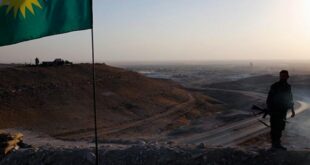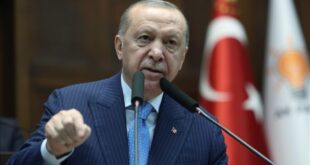
Cairo has denied Moroccan reports that Egypt plans to inaugurate a consulate in Western Sahara, which has been disputed for decades between Morocco and the Polisario Front backed by Algeria.
Reports have circulated in the Moroccan media that Egypt will soon inaugurate a consulate in Laayoune, one of the largest cities in the disputed Western Sahara, the scene of decades of conflict between Morocco and the Algeria-backed Polisario Front.
Morocco’s Le360 news site reported Dec. 21 that Egyptian President Abdel Fattah al-Sisi announced plans to dispatch Foreign Minister Sameh Shoukry to Rabat, where he will coordinate the opening of an Egyptian consulate in Western Sahara with his Moroccan counterpart Nasser Bourita.
The Polisario Front, a pro-independence movement established in 1973, proclaimed the Sahrawi Arab Democratic Republic in 1976 and joined the African Union in 1984. The group is seeking the independence of Western Sahara from Morocco, which has controlled over 80% of the vast desert since the Spanish withdrawal in 1975 and considers it an integral part of its territory. The Polisario Front and its Algerian ally, which hosts Sahrawi refugees, are campaigning for a referendum on Western Saharan independence.
Morocco is betting on foreign consulates opening in Western Sahara, Bourita says. During the opening of the Bahraini Consulate in the disputed territory on Dec. 14, Bourita said the international community is convinced that the dispute can only be resolved within the framework of Moroccan sovereignty over the territory.
Meanwhile, US Secretary of State Mike Pompeo tweeted that the United States would also open a consulate in Western Sahara Dec. 24. President Donald Trump’s administration recognized Morocco’s sovereignty over the territory, the only Western country to do so, when Rabat agreed to normalize relations with Israel. US President-elect Joe Biden, who is set to be sworn in Jan. 20, will have to decide whether to uphold the US agreement with Morocco.
Morocco views the opening of foreign diplomatic representations in Western Sahara as affirmation of its sovereignty over the territory while the Polisario Front and Algeria condemn the openings as a violation of international law.
The number of diplomatic missions in Western Sahara hit 18 after Bahrain and Haiti opened their consulates in the territory in December. The United Arab Emirates was the first Arab country to open a consulate in Laayoune on Nov. 4, and Jordan has expressed its intention to do the same.
Rakha Hassan, a member of the Egyptian Council for Foreign Affairs, said that Egypt will not open a consulate in Western Sahara. He told Al-Monitor via phone, “Egypt has no interest in this territory.”
Hassan questioned the accuracy of the Moroccan press reports, saying, “Egypt’s position has remained unchanged on the Western Sahara issue so far, and this position will not change overnight.” He added, “Egypt’s position on the Western Sahara issue is the same and in line with UN resolutions that call for a referendum allowing the Western Sahara citizens to decide either to be part of Morocco or to be independent.”
After the truce agreement signed between the Polisario Front and the Moroccan government in 1991 under the UN, a referendum was set to be held on the Western Sahara dispute. Yet as the sides failed to agree on voter eligibility, the dispute has remained unsolved.
The Western Sahara crisis has long been a reason for tense relations between Egypt and Morocco, particularly since Sisi took office. The Moroccans feel that Egypt is biased toward Algeria, the main supporter of the Polisario Front.
On Dec. 15, Egypt called on Morocco and the Polisario Front to exercise restraint and respect the UN Security Council’s resolutions, including the 1991 truce agreement, and to refrain from taking any provocative actions that would harm economic and trade interests in this region.
The Egyptian call came amid fears that the two sides would resume military operations in one of Africa’s oldest disputes, after recently breaching the UN-brokered truce agreement that ended years of fighting. Moroccan forces launched a military operation Nov. 13 in the buffer zone of Guerguerat in southern Western Sahara to clear a road that has been blockaded by the Polisario Front since Oct. 21. The road leads to Guerguerat, the gateway to Mauritania.
Polisario chief Ibrahim Ghali ended his group’s commitment to the truce in a Nov. 14 decree.
The Egyptian Ministry of Foreign Affairs stressed in a Nov. 15 statement the need to commit to dialogue and resume the political process to resolve the crisis and bring about stability, protect all parties’ interests and abide by international law, especially state sovereignty.
Egypt has been neutral regarding the tension in the buffer zone of Guerguerat while Gulf and other Arab states, including Cairo’s allies Saudi Arabia and the United Arab Emirates, support Morocco against the Polisario Front.
Egypt fears that recognizing Morocco’s sovereignty over Western Sahara might jeopardize its Algerian relations, which are stronger than its ties with Morocco.
Algeria was one of the first Arab countries Sisi visited less than a month after assuming power in June 2014. That December, the Egyptian Ministry of Petroleum announced a deal to import natural gas from Algeria at half price, as part of efforts to overcome Egypt’s energy and economic crises following the fall of the Muslim Brotherhood in July 2013.
Algeria has backed Egypt during several other crises. In October 2016, after Saudi Aramco suspended petroleum shipments to Egypt, Algeria sent Cairo more than 30,000 tons of diesel fuel. Egypt and Algeria routinely work together in the fight against terrorism and illegal migration and share common visions on the conflict raging in neighboring Libya.
Yasmine Hasnaoui, a Moroccan researcher on the Western Sahara conflict, told Al-Monitor, “There is nothing official regarding the opening of an Egyptian consulate in Western Sahara. If Egypt decides to open a consulate, it is because it sees that Morocco is becoming an important partner to several big states, notably the United States.”
Hasnaoui went on, “If this move happens, it will bolster Egypt’s economic partnership not only with Morocco but with many other countries in Europe and Africa on several levels.”
She continued, “International relations are not based on feelings, but rather partnership, and Morocco is gaining momentum regarding the Western Sahara issue.”
 Eurasia Press & News
Eurasia Press & News



